
A new survey from Azerbaijani think-tank the Agora Analytical Collective shows which countries young Azerbaijanis like and dislike, which they see as a threat or an ally, and their views on the conflict with Armenia.
The survey polled 400 people aged 18–35 living in different regions of Azerbaijan. It aimed to explore young people’s attitudes on international affairs, as well as the Nagorno-Karabakh conflict.
Asked what region they considered Azerbaijan to be a part of, a majority of the young people polled, 60%, named the South Caucasus, followed by 18% who named Europe. Only 8% said Azerbaijan was a part of either Central Asia or the Middle East, despite it frequently being named as such by some internationally.
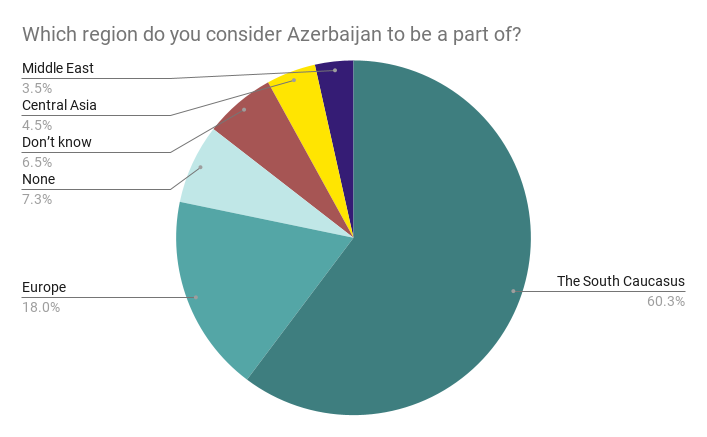
Asked about their opinions on different countries, those polled had negative opinions of three of the five countries with whom Azerbaijan shares a border.
Russia, whose peacekeepers are stationed in Nagorno-Karabakh, was among the least popular countries asked about, with a net approval rating of −34.
Neighbours Armenia and Iran were at the bottom of the list, with −73 and −68 point approval ratings.
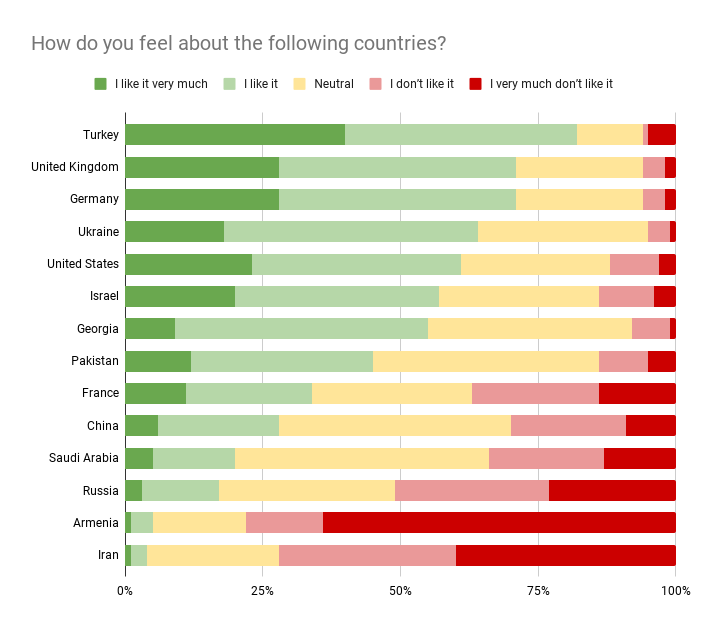
The young people polled also expressed concern about Russia, Armenia, and Iran, with 81%, 74%, and 73% naming those countries as security threats to Azerbaijan.
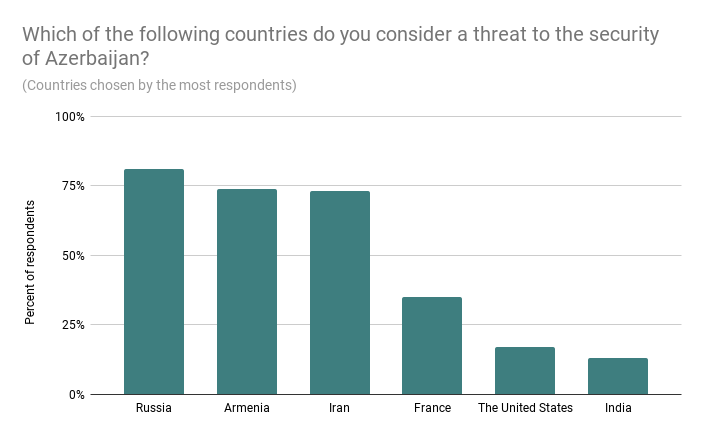
France, which those polled had a negative (−3 point) opinion of, was also named as a threat by 35% of respondents. France has grown increasingly critical of Azerbaijan over the Nagorno-Karabakh conflict and the broader conflict with Armenia.
India, which has recently signed several arms contracts with Armenia, was named a threat by 13% of respondents.
Despite the US’s strong net approval rating of 49, it also appeared in the top six countries named as a security threat to Azerbaijan. While only 12% held negative opinions towards the country, 17% named it as a threat.
The young Azerbaijanis polled had positive views of the country’s two other neighbours, Turkey and Georgia.
Turkey, unsurprisingly, topped the list of most popular countries, with a 76 point net approval rating. A small minority of 5% said they very much did not like the country. Turkey was seen as an ally by 91% of those polled.
Georgia had a 47 point approval rating, with a sizable number of respondents, 37%, holding ambivalent views of the country. Georgia was seen as an ally by 26% of respondents.
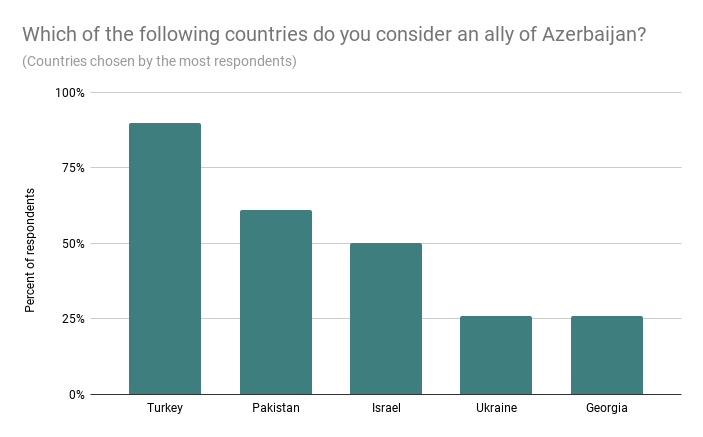
Israel, with which Azerbaijan shares a strategic partnership, including weapons supplies to Azerbaijan, was named an ally by 50% of respondents. The country had a positive (43 point) net approval rating among those polled.
While only 45% of those polled held positive views of Pakistan (against 14% negative and 41% neutral), it was seen as an ally by 61%. Pakistan has been outspoken in its support for Azerbaijan in the Nagorno-Karabakh conflict, and is the only UN Member State not to recognise Armenia’s independence from the Soviet Union.
As far as regional blocks were concerned, a strong majority of the young people polled (61%) were in favour of Azerbaijan joining the EU over the Russian-led Eurasian Union (3%). Around 16% said they didn’t support joining either while 20% said they did not know.
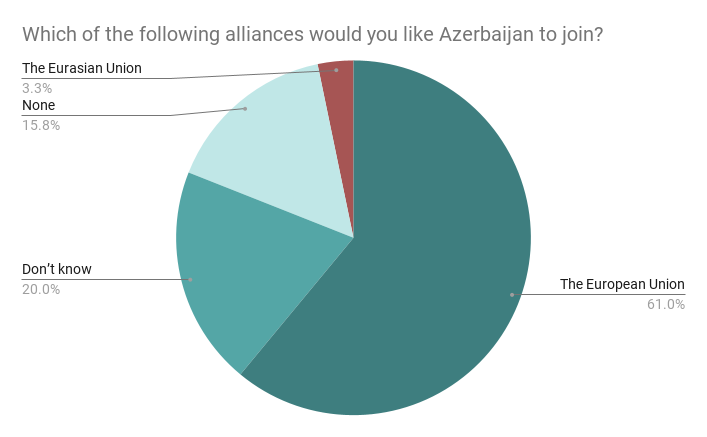
The young people polled were not optimistic about the Nagorno-Karabakh conflict or relations with Armenia. While 62% supported the normalisation of relations with Armenia, only 23% said they believed the conflict would soon be resolved.
In Nagorno-Karabakh, 59% said they thought that coexistence between Armenians and Azerbaijanis was not possible. A majority of those polled also seemed unwilling to compromise on the conflict, with only 19% supporting granting Nagorno-Karabakh any kind of special status within Azerbaijan, and a further 14% uncertain.
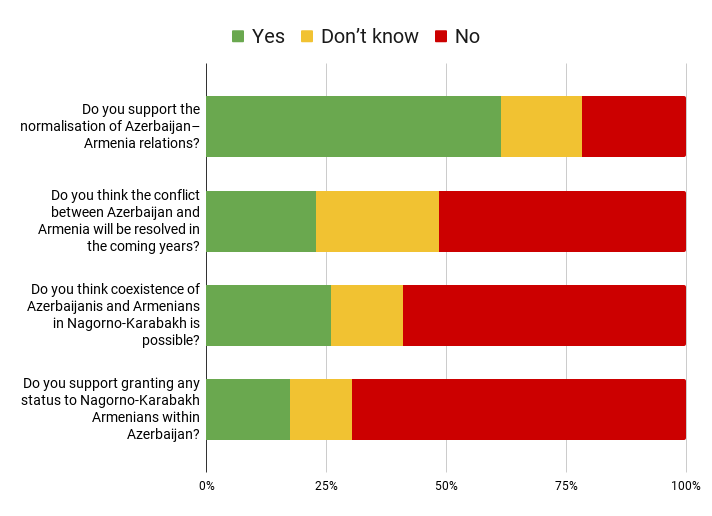
The survey by the Agora Analytical Collective was conducted from 20 November to 27 December 2022 using a hybrid method. Some respondents answered the questions through face-to-face interviews, while volunteers shared a link to the survey through their different communities (such as topical groups on social media).
Care was taken not to limit the survey to certain segments of the youth population.
Of those who took part in the survey, 56% lived on the Absheron Peninsula, where the capital, Baku, is located. The other 44% were distributed throughout 12 economic and 29 administrative districts. 51% of respondents were men and 49% were women.







